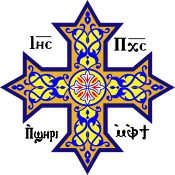| Part of a series on the |
| Copts |
|---|
| Culture |
| Regions |
| Denominations |
|
|
Coptic nationalism refers to the nationalism of the Copts (Coptic: ⲚⲓⲢⲉⲙ̀ⲛⲭⲏⲙⲓ ̀ⲛ̀Ⲭⲣⲏⲥⲧⲓ̀ⲁⲛⲟⲥ Niremenkīmi Enkhristianos, Arabic: أقباط Aqbat), a Christian ethnic and religious minority [1] that primarily inhabit the area of modern Egypt. Coptic nationalism does not have a claim for a Coptic nation but asks for an equal position for Copts in Egypt.[2] Most Copts live in the south of Egypt but the largest concentrations of Copts lives in Cairo and Alexandria.[3] The Copts, like the rest of Egyptians, are descended from the pharaonic inhabitants of Egypt. Most ethnic Copts belongs to the Coptic Orthodox Church. Copts number between 10-15 percent of the Egyptian population[4] of 104 million[5]
The Copts and Egyptian Muslims have many similarities in their identity, as they have lived amongst one another for centuries.[6] The relation between the Copts and Muslims was mostly relaxed before the 1960s, but afterwards the tensions between the respective groups grew. The violence against the Copts increased in the Nassar, Sadat and Mubarak eras. The Copts suffered in ethnic, political and material ways,[7][8][9] and realized they needed to strengthen their positions in these regards.[10] For example, many Copts sought refuge in the United States, which in turn weakened the position of the Copts who stayed in Egypt. These Copts today still face critics and violence against their churches and monasteries.[11]
- ^ Minahan 2002, p. 467 [dead link]
- ^ Van Der Vliet, Jacques (2010-01-01), "The Copts: 'Modern Sons Of The Pharaohs'?", Religious Origins of Nations?, BRILL, pp. 279–290, doi:10.1163/ej.9789004173750.i-366.57, ISBN 978-90-474-4436-7, retrieved 2023-05-17
- ^ Doubt, Keith; Shatzmiller, Maya (2005). "Islam and Bosnia: Conflict Resolution and Foreign Policy in Multi-Ethnic Societies". Sociology of Religion. 66 (1): 92. doi:10.2307/4153123. ISSN 1069-4404. JSTOR 4153123.
- ^ "Egypt's Sisi meets world Evangelical churches delegation in Cairo". 19 Nov 2017.
- ^ Pennington, J. D. (April 1982). "The Copts in modern Egypt". Middle Eastern Studies. 18 (2): 158–179. doi:10.1080/00263208208700503. ISSN 0026-3206.
- ^ Tadros, Mariz (2013-06-15), "Coptic Protest and Copts in Protest", Copts at the Crossroads, American University in Cairo Press, pp. 161–182, doi:10.5743/cairo/9789774165917.003.0009, ISBN 9789774165917, retrieved 2023-05-17
- ^ Doubt, Keith; Shatzmiller, Maya (2005). "Islam and Bosnia: Conflict Resolution and Foreign Policy in Multi-Ethnic Societies". Sociology of Religion. 66 (1): 92. doi:10.2307/4153123. ISSN 1069-4404. JSTOR 4153123.
- ^ May, Stephen; Modood, Tariq; Squires, Judith (2004-11-11), "Ethnicity, nationalism, and minority rights: charting the disciplinary debates", Ethnicity, Nationalism, and Minority Rights, Cambridge University Press, pp. 1–24, doi:10.1017/cbo9780511489235.002, ISBN 9780521603171, retrieved 2023-05-17
- ^ Kan, Toby (2020-09-03). "Coptic Christians and Muslims in Egypt: Two Communities written by Flkry F. Andrawes, and Alison Orr-Andrawes". International Journal of Asian Christianity. 3 (2): 240–241. doi:10.1163/25424246-00302011. ISSN 2542-4238. S2CID 234613656.
- ^ May, Stephen; Modood, Tariq; Squires, Judith (2004-11-11), "Ethnicity, nationalism, and minority rights: charting the disciplinary debates", Ethnicity, Nationalism, and Minority Rights, Cambridge University Press, pp. 1–24, doi:10.1017/cbo9780511489235.002, ISBN 9780521603171, retrieved 2023-05-17
- ^ Affairs, Berkley Center for Religion, Peace and World. "Minority (Trans)Nationalism between Egypt and the United States". berkleycenter.georgetown.edu. Retrieved 2023-05-17.
{{cite web}}: CS1 maint: multiple names: authors list (link)
© MMXXIII Rich X Search. We shall prevail. All rights reserved. Rich X Search

